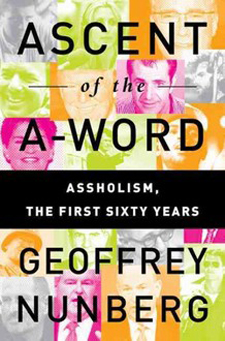
Ascent of the A-Word: Assholism, The First Sixty Years
By Geoffrey Nunberg
PublicAffairs
272 pages
_______________
Linguist and Berkeley professor Geoffrey Nunberg states early in his new book Ascent of the A-Word: Assholism, the First Sixty Years, "What I'm interested in isn't a distinct species of congenital jerks, but a social condition and a disposition that everyone is liable to on trying occasions." He dismisses those who would limn the subtle distinctions between an "asshole" an "assclown" or a "douchebag," writing, "despite the variation[s], everyone recognizes asshole as the primary name of a basic category of American moral life." Which is to say, we know it when we see it.
Fair enough, but it must be said, his book dedicates much ink to bolstering the word's distinctions. "When you hear someone proudly declaring himself an asshole, it's a fair conclusion that he's not an asshole at all, he's just a dick," he later writes. A dick knows what he is and how people perceive him. But according to Nunberg, an asshole is a singly different species. Plagued by "obtuseness," he "... imagines that his role or status gives him privileges that aren't really his to claim."
Nunberg cites a man barging to the front of the line in a crowded car rental agency on 9/11 to demand, "Where's the Hertz Gold Card line?" This is the vague, yet precise, definition he establishes before moving on to his larger beast: "assholism," a form of public behavior whereby, "The more of an asshole you can make your adversaries seem, the more of an asshole you can permit yourself to appear, so as to bond with your fellows with provocative gestures of insensitivity..."
As one example, Nunberg mentions Ann Coulter's Muslim-bashing, which he suspects she does for the sole purpose of rallying her fans and enraging "the libs." He lists others, left and right, from Paul Krugman to Donald Trump, but it's worth noting that here we've already replaced his earlier meaning with something else. If assholism is the witting provocation of one's adversaries, then its defining characteristic is not obtuseness so much as the effective opposite: intentionality.
Let's agree that the man with the Hertz Gold Card is probably an asshole (here the word has a kind of verisimilitude, or as Nunberg puts it, it's just the "shoe that fits"); but if that's assholism, it isn't the same thing as what so many politicians, media personalities and their followers do. Aren't they just engaging in plain old partisan dog-whistling, central in any democracy?
Nunberg asserts that the nature of our politics, the media and the Internet have "created a host of new occasions for acting like assholes and new ways of performing assholism," which constitutes a new age. But he is at pains to distinguish assholism from that tired old saw, "incivility," which he admits is nothing new. He says it's assholism because of its tone and method of delivery -- because we're uncivil in new ways. But isn't this the same light source merely refracting through a newer medium?
Nunberg also argues that this is the Age of the Asshole because we now "find the phenomenon and its practitioners so interesting." But a cursory glance at past literature shows plenty of compelling and "compellingly repugnant" characters who fit Nunberg's asshole, from Homer's Agamemnon to Melville's Ahab to Chekhov's smug, fatuous huntsman, Yegor Vlasych. Nunberg himself invokes Shakespeare's Malvolio.
Why are characters such as these so compelling, then as now? It's a valid question, but the phenomenon itself isn't new. For the Greeks and Melville these characters served a didactic purpose to warn against hubris. Perhaps we enjoy watching assholes tempt their fate, or even overturn it. Perhaps we all have an asshole id in need of succor. Or maybe assholes behaving badly aren't what's compelling at all. There are plenty of assholes, boring as a doorknob, who get no more attention than anyone else.
Nunberg's diagnosis of public life seems unnecessary. The book is far more interesting as a linguistic study. Its middle chapters return a profit tracing the historical evolution of the word's meaning. WWII soldiers coined it. It took to literature in Norman Mailer's The Naked and the Dead, then was adopted by the counter-culture of the 60s, by country singers like Willie Nelson and David Allan Coe, by the feminist movement, and so forth. This signifies an unprecedented occurrence: an obscenity emerging from traditionally "low society" to be used by all classes. Never was a word that you're not supposed to say naturalized in such a way. This is the discussion, fascinating on its own, that leads him to his grand theory of assholism today.
But, ultimately, what's most interesting isn't that "assholism" might encapsulate early 21st century life. It's that we as a culture would need such a word in the first place. What void did it fill in our shared consciousness, our exchange of ideas? Perhaps the answer lies with George Orwell, who, in the same decade that asshole began its ascent, lamented the bleeding of all meaning from words of former force and import. "The word Fascism has now no meaning except in so far as it signifies 'something not desirable,'" Orwell wrote in "Politics and the English Language," also listing "democracy, socialism, freedom, patriotic, realistic, justice." These terms, still constantly bandied about, are bereft of substance while asshole is so potent as to be proffered to label an entire age. If this is the Age of the Asshole, it isn't because we suddenly find assholes compelling, or because it's easier than ever to be one. It's because it's one of the few words left that we all seem to actually understand. These days, if you're not a socialist then you must be a fascist; but we're all assholes now.
This review originally appeared in the Literary Issue of Huffington, in the iTunes App store.
